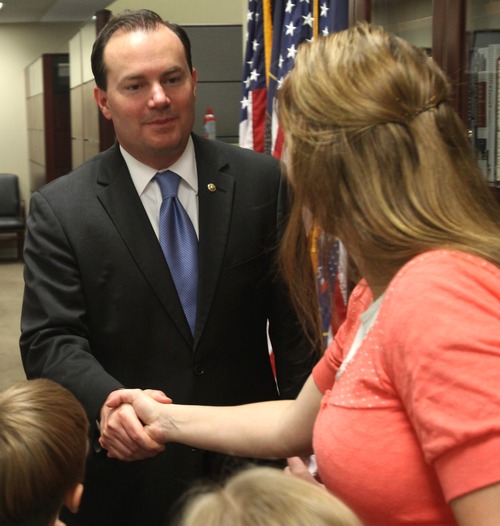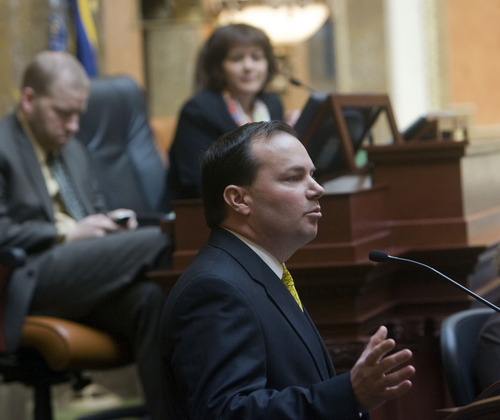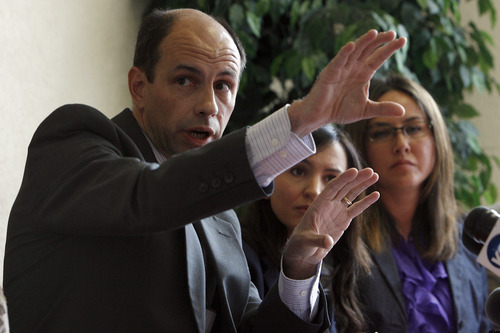This is an archived article that was published on sltrib.com in 2012, and information in the article may be outdated. It is provided only for personal research purposes and may not be reprinted.
Washington • Sen. Mike Lee opposed amnesty for illegal immigrants in his 2010 campaign and he continues to fight it now, which makes his inclusion in a bipartisan group working on comprehensive reform all the more surprising.
The Utahn is one of four Republicans holding private talks with four Democrats in hopes of overhauling the nation's immigration laws by the end of 2013.
And, yet, Lee is the only participant who has never supported a pathway to legal status or citizenship for the more than 11 million people in this country illegally.
"I'm not interested in anything that offers amnesty and I've made no secret about that," he told The Salt Lake Tribune on Wednesday. "But there, I think, is potential to find common ground."
Sen. Chuck Schumer, D-N.Y., who is spearheading the effort, personally asked Lee to participate, in part because the two had worked on a smaller immigration bill in 2011. Schumer refused to talk about the working group or Lee's involvement, but he did offer a quick compliment of his Utah colleague.
"In general, I have tremendous respect for Mike Lee even though we disagree on a lot of issues," said Schumer. "He is thoughtful and hard working."
The other Democrats involved are Sens. Dick Durbin of Illinois, Bob Menendez of New Jersey and Michael Bennet of Colorado. The Republicans joining Lee are Sens. John McCain of Arizona, Lindsey Graham of South Carolina and Sen.-elect Jeff Flake of Arizona.
Such working groups are common in the Senate, though their success is not. A similar "Gang of Eight" has met for the past few years in an attempt to craft a fiscal reform bill, a goal that has eluded the group.
What some staffers have jokingly referred to as the "Gang of Ocho" has met and had preliminary talks, though the hard negotiations won't take place for months and as a result the members are hesitant to discuss the effort in detail.
Menendez welcomed Lee, one of the Senate's most conservative members, to the conversation, which has largely stagnated since Congress rejected immigration reform pushed by President George W. Bush in 2007. All of the participants, except for Bennet, Flake and Lee were part of that effort.
"I think some of his libertarian streaks actually may play very well in the question of immigration reform," Menendez said of Lee. "He obviously brings a dimension to the group that can be helpful in getting what I think is a national security concern, a national economic concern and a basic fundamental justice issue."
Legal immigration • Lee wants to focus on improving enforcement of immigration laws and simplifying the complicated process to obtain visas, but he is also open to making it easier for illegal immigrants to gain legal access to the United States if they return to their home country.
"We want to make the legal immigration process as easy to understand as possible," Lee said. "We want to make it run as smoothly as possible and we want to make illegal immigration less easy and less appealing."
He doesn't favor the Dream Act, which he considers amnesty, but is open to "some kind of asylum" for children of illegal immigrants who have no connection to the country their parents came from.
And while he has opposed an overarching immigration bill in the past, Lee said he can see some value in combining at least border security, immigration enforcement and a streamlined visa process into one package.
That kind of approach infuriates Mark Alvarez, an immigration attorney in Salt Lake City, who believes any deal should include a way for undocumented immigrants to become citizens.
"If you are serious about immigration reform," he said, "the first question is what are you going to do about the 11 million people who are here without documents."
Alvarez was dumbfounded to see Lee's name on the list of senators spearheading what is expected to be one of the year's biggest public policy debates.
"I was immediately skeptical of Lee," he said. "It struck me as odd. He was the oddest member of that group."
Alvarez, who also co-hosts the "Sin Rodeos" Spanish-language radio show, remains upset at Lee's use of the derisive term "anchor baby" in his 2010 campaign. Lee used the term a few times while arguing against allowing birthright citizenship for children of illegal immigrants born in this nation and the senator has since backed away from the term, calling it "imprecise."
Alvarez wasn't the only one surprised by Lee's involvement in the private talks.
"We are going to grant amnesty" • State Rep. Chris Herrod, R-Provo, one of Utah's most outspoken voices against offering citizenship to illegal immigrants, said he couldn't envision any deal negotiated by the Senate working group that he could back, or that Lee could support for that matter.
"I already know what is going to happen. We are going to grant amnesty," said Herrod, who predicts that it would create another cycle of illegal immigration in the next decade.
The state lawmaker worries that Republicans are overreacting to the 2012 election, where more than 70 percent of Hispanic voters supported President Barack Obama. Some, including House Speaker John Boehner, R-Ohio, said it's time to push immigration reform as an outreach to Hispanics, but Herrod contends that most of those voters are out of reach for GOP candidates, because they tend to support Democratic views on health care and the social safety net.
"I'm just afraid Republicans are so concerned in D.C. that they are ready to throw out their principles," he said.
Herrod's glad to have someone like Lee in the negotiations to represent his views, though he's a little wary.
"I have supported Mike's stance in the past and I would hope he would keep to his position," he said.
For his part, Lee said he isn't changing his immigration stances, and he dismisses Herrod's conclusion that any deal would include citizenship for undocumented immigrants.
"I don't think it is a foregone conclusion at all and my colleagues know I'm not interested in amnesty," Lee said. "The same principles that I applied in my campaign are going to be the principles that I still hold. But again, going into these discussions, I want to be able to evaluate both the legal status quo and what needs to change."
Immigration was a major issue in Lee's 2010 Senate campaign, with much of the attention going to his opposition to birthright citizenship guaranteed by the 14th Amendment.
Expanding visas • Since joining the Senate, Lee has not pushed that issue, but he has signed on to a trio of immigration bills, with the biggest attention grabber being one he sponsored with Schumer.
Their bill would allow wealthy foreigners to gain a three-year visa if they invested at least $500,000 in residential real estate and lived in the home at least six months out of the year. Schumer and Lee argued their proposal would boost a struggling housing market, while reducing barriers to primarily Canadian and Chinese visitors.
Lee also pushed a bill that would allow guest workers to stay on dairy and sheep farms for three years, extending their visas, and he carried a proposal first pushed by Rep. Jason Chaffetz, R-Utah, in the House, that would distribute visas unused by countries to those with a long waiting list.
Groups such as the Salt Lake Chamber have been pressuring Chaffetz, Lee and the state's other members of Congress to lead out on immigration, particularly after the state Legislature passed a slate of bills in 2011 involving enforcement of immigration laws and a guest-worker program. The enforcement bill is now tied up in court and the state hasn't set up the guest-worker program.
Natalie Gochnour, the chief economist for the Salt Lake Chamber, met with Schumer, Menendez, Lee and others last week to advocate for a major immigration bill.
In those meetings, Gochnour heard about the "scars" and "bruises" from the failed immigration reform bid of 2007 and said having fresh faces, like Lee, in the debate is important.
"He represents new leadership that wasn't a part of the breakdown that occurred last time," she said.
Gochnour added that the chamber, which supports a path to citizenship, has had a "steady dialogue" with Lee and his staff about immigration, and while she recognizes his strong stance, believes he is approaching this process with an open mind.
Lee told The Tribune that he would seek some creative solutions to the emotionally charged issue, keeping in mind that this nation was built and sustained by people from foreign lands.
"I hope we continue to be a country of immigrants," Lee said. "We want immigrants to continue to come. We want them to come through the front door."
Twitter: @mattcanham







